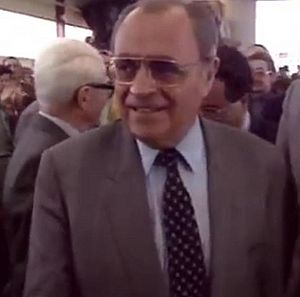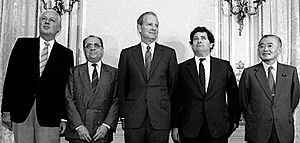Pierre Bérégovoy facts for kids
Quick facts for kids
Pierre Bérégovoy
|
|
|---|---|
 |
|
| Prime Minister of France | |
| In office 2 April 1992 – 29 March 1993 |
|
| President | François Mitterrand |
| Preceded by | Édith Cresson |
| Succeeded by | Édouard Balladur |
| Personal details | |
| Born |
Pierre Eugène Bérégovoy
23 December 1925 Déville-lès-Rouen, France |
| Died | 1 May 1993 (aged 67) Nevers, France |
| Political party | SFIO (until 1959) PSU (1960–69) PS (1969–93) |
| Occupation | Metallurgist, politician |
Pierre Bérégovoy (French pronunciation: [pjɛʁ øʒɛn beʁeɡɔvwa]; born December 23, 1925 – died May 1, 1993) was an important French politician. He served as the Prime Minister of France under President François Mitterrand. His time as Prime Minister was from April 2, 1992, to March 29, 1993. He was a member of the Socialist Party. He also served as a Member of Parliament for the area of Nièvre's 1st constituency.
Contents
Early Life and Political Start
Pierre Bérégovoy was born in Déville-lès-Rouen, a town in France. His mother was French, and his father was Ukrainian. His father had moved from the Russian Empire after the Russian Civil War.
Pierre started working at just 16 years old. He was a skilled metal worker. He became involved in politics because of his work in the French Resistance during World War II. He worked for the French railway company, SNCF, at that time.
He joined a socialist group called the SFIO. He also joined a trade union called Workers Force. In 1949, he became an adviser to the Minister of Public Works and Transport. A year later, he worked as a technical agent for Gaz de France, a gas company.
In 1959, he left the SFIO. He helped start a new group called the Unified Socialist Party (PSU). He then became an adviser to another important politician, Pierre Mendès-France. In 1967, he helped create a group that later joined the Socialist Party (PS) in 1969. He became a key member of the party, working closely with François Mitterrand.
Rising in Government
When François Mitterrand became President of France in 1981, Pierre Bérégovoy was chosen for a top role. He became the Secretary General of the Presidency. This meant he was a very close helper to the President.
A year later, in 1982, he joined the government as the Minister of Social Affairs. He was one of the politicians who suggested that France should leave the European Monetary System. This was to help continue the Socialist economic plans. However, President Mitterrand decided to follow his Prime Minister's advice and changed the economic policy.
From 1984 to 1986, Bérégovoy served as the Minister of the Economy and Finance. This was a very important job.
In 1983, he was elected mayor of Nevers. In 1986, he became a Member of Parliament for the Nièvre area. This was the same area President Mitterrand came from. Bérégovoy also managed Mitterrand's campaign for the 1988 French presidential election. After Mitterrand was re-elected, Bérégovoy returned to his role as Minister of the Economy and Finance. In this job, he helped show how French socialism could work with a market economy. He also built good relationships with business leaders.
Prime Minister of France
After the 1992 French regional elections, which were difficult for the Socialist Party, Pierre Bérégovoy was finally chosen as Prime Minister. He promised to work hard to fight unemployment, economic problems, and corruption.
During his time as Prime Minister, several important changes were made.
- In May 1992, farmers received more help, including lower taxes and more grants for young farmers.
- In June 1992, a law was passed to encourage different types of people to live together in public housing.
- A law in July 1992 aimed to improve the status of child-minders and the quality of child care.
- Another law in July 1992 made it easier for people to get medical help.
- The Sapin law in January 1993 aimed to prevent corruption and make economic activities more open.
- A law in January 1993 set up the idea of both parents having authority over children, even if they divorced.
- Housing benefits were also expanded in 1993.
He left his position as Prime Minister after the Socialist Party lost many seats in the 1993 French legislative election in March 1993.
Political Roles and Offices
Pierre Bérégovoy held many important roles throughout his political career:
In the President's Office
- Secretary General of the Presidency of the Republic: 1981–1982.
In the Government
- Prime Minister: 1992–1993.
- Minister of Economy and Finances: 1984–1986 and 1988–1992.
- Minister of Social Affairs: 1982–1984.
Elected Positions
- Member of the National Assembly of France for Nièvre: 1986–1988 (he became a minister in 1988) and March–May 1993 (he passed away in May 1993). He was elected in 1986, and reelected in 1988 and 1993.
- General Councillor of the Nièvre: 1985–1993 (he passed away in May 1993). He was reelected in 1992.
- Mayor of Nevers: 1983–1993 (he passed away in May 1993). He was reelected in 1989.
- Municipal councillor of Nevers: 1983–1993 (he passed away in May 1993). He was reelected in 1989.
Death
Pierre Bérégovoy passed away on May 1, 1993, in Nevers, France. Friends said he had been very sad after his party lost the March legislative elections.
Bérégovoy's Government (April 2, 1992 – March 29, 1993)
Here are some of the key ministers who served in Pierre Bérégovoy's government:
- Pierre Bérégovoy – Prime Minister
- Roland Dumas – Minister of Foreign Affairs
- Pierre Joxe – Minister of Defense
- Paul Quilès – Minister of the Interior and Public Security
- Michel Sapin – Minister of Economy, Finance, and Privatization
- Michel Charasse – Minister of Budget
- Dominique Strauss-Kahn – Minister of Industry and External Commerce
- Martine Aubry – Minister of Labour, Employment, and Vocational Training
- Michel Vauzelle – Minister of Justice
- Jack Lang – Minister of National Education and Culture
- Louis Mermaz – Minister of Agriculture and Forests
- Ségolène Royal – Minister of Environment
- Frédérique Bredin – Minister of Youth and Sports
- Louis Le Pensec – Minister of Overseas Departments and Territories
- Jean-Louis Bianco – Minister of Transport, Housing, and Equipment
- Louis Mermaz – Minister of Relations with Parliament
- Bernard Kouchner – Minister of Health and Humanitarian Action
- Émile Zuccarelli – Minister of Posts and Telecommunications
- Michel Delebarre – Minister of Civil Service and Administrative Reform
- François Loncle – Minister of City, Minister of Planning
- Bernard Tapie – Minister of City
- Hubert Curien – Minister of Research and Space
- René Teulade – Minister of Social Affairs and Integration
Changes in the Government
- May 23, 1992 – Bernard Tapie left the ministry.
- October 2, 1992 – Martin Malvy took over as Minister of Budget. Jean-Pierre Soisson became Minister of Agriculture and Rural Development.
- December 26, 1992 – Bernard Tapie returned as Minister of City.
- March 9, 1993 – Pierre Joxe left the Ministry of Defence. Pierre Bérégovoy took over this role while remaining Prime Minister.
See also
 In Spanish: Pierre Bérégovoy para niños
In Spanish: Pierre Bérégovoy para niños
 | Aurelia Browder |
 | Nannie Helen Burroughs |
 | Michelle Alexander |


